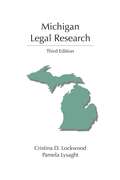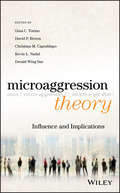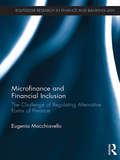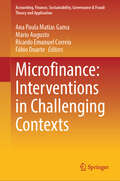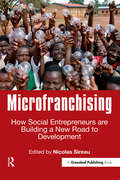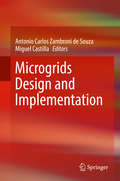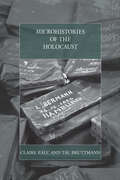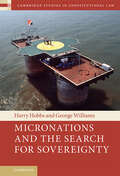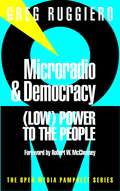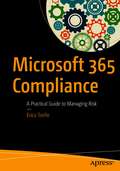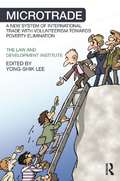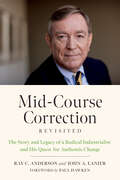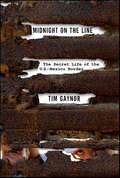- Table View
- List View
Michigan Criminal Law and Procedure: A Manual for Michigan Police Officers (2nd Edition)
by Michigan Department of State PoliceSeveral legal instructors throughout the state of Michigan contributed to the development of this and previous editions of this book in hopes that it will help police officers and police recruits comprehend the legal parameters that they operate within on a day-to-day basis.
Michigan Legal Research
by Pamela Lysaght Cristina LockwoodMichigan Legal Research, Third Edition, is a concise, yet thorough, guide to conducting legal research in Michigan. Importantly, it also includes references to federal legal resources. In addition to updating all sources discussed, this edition, more so than previous editions, focuses on free legal resources, including current commercial and government sources. For the free online sources, this edition includes directions on how to navigate the website to make it easy for the reader to find the relevant information. Where applicable, references to new and established subscription-based resources are juxtaposed against those resources that are available for free. The goal is to help the reader make an informed decision regarding when to use a fee-based service as opposed to a free legal resource. This edition continues to draw upon the authors' years of experience teaching legal writing and research by providing the tools for conducting efficient and effective legal research, as well as discussing the interplay between legal research and legal analysis.
Microaggression Theory: Influence and Implications
by Derald Wing Sue Kevin L. Nadal Gina C. Torino David P. Rivera Christina M. CapodilupoGet to know the sociopolitical context behind microaggressions Microaggressions are brief, everyday exchanges that send denigrating messages to certain individuals because of their group membership (e.g., race, gender, culture, religion, social class, sexual orientation, etc.). These daily, common manifestations of aggression leave many people feeling vulnerable, targeted, angry, and afraid. How has this become such a pervasive part of our social and political rhetoric, and what is the psychology behind it? In Microaggression Theory, the original research team that created the microaggressions taxonomy, Gina Torino, David Rivera, Christina Capodilupo, Kevin Nadal, and Derald Wing Sue, address these issues head-on in a fascinating work that explores the newest findings of microaggressions in their sociopolitical context. It delves into how the often invisible nature of this phenomenon prevents perpetrators from realizing and confronting their own complicity in creating psychological dilemmas for marginalized groups, and discusses how prejudice, privilege, safe spaces, and cultural appropriation have become themes in our contentious social and political discourse. Details the psychological effects of microaggressions in separate chapters covering clinical impact, trauma, related stress syndromes, and the effect on perpetrators Examines how microaggressions affect education, employment, health care, and the media Explores how social policies and practices can minimize the occurrence and impact of microaggressions in a range of environments Investigates how microaggressions relate to larger social movements If you come across the topic of microaggressions in your day-to-day life, you can keep the conversation going in a productive manner—with research to back it up!
Microfinance and Financial Inclusion: The challenge of regulating alternative forms of finance (Routledge Research in Finance and Banking Law)
by Eugenia MacchiavelloFollowing the recent global financial crisis there is a growing interest in alternative finance – and microfinance in particular – as new instruments for providing financial services in a socially responsible way or as an alternative to traditional banking. Nonetheless, correspondingly there is also a lack of clarity about how to regulate alternative financial methods particularly in light of the financial crisis’ lessons on regulatory failure and shadow banking’s risks. This book considers microfinance from a legal and regulatory perspective. Microfinance is the provision of a wide range of financial services, particularly credit but also remittances, savings, to low-income people or financially excluded people. It combines a business structure with social inspiration, often resorts to technological innovations to lower costs (Fintech: e.g. crowdfunding and mobile banking) and merges with traditional local experiences (e.g. financial cooperatives and Islamic finance), this further complicating the regulatory picture. The book describes some of the unique dimensions of microfinance and the difficulties that this can cause for regulators, through a comparative analysis of selected European Union (EU) countries’ regimes. The focus is in fact on the EU legal framework, with some references to certain developing world experiences where relevant. The book assesses the impact and validity of current financial regulation principles and rules, in light of the most recent developments and trends in financial regulation in the wake of the financial crisis and compares microfinance with traditional banking. The book puts forward policy recommendations for regulators and policy makers to help address the challenges and opportunities offered by microfinance.
Microfinance, Rights and Global Justice
by Tom Sorell Luis Cabrera Sorell, Tom and Cabrera, LuisMicrofinance - the practice of providing small loans to promote entrepreneurial activity among those with few financial assets - is increasingly seen as a sustainable means of aiding the global poor. Perhaps its most influential advocate, Nobel Laureate Muhammad Yunus, has claimed that there is a human right to microfinance, given its potential for poverty alleviation. This book directs critical philosophical attention at this very widely used and praised poverty-reducing measure. In chapters that discuss microfinance schemes and models around the world, internationally renowned contributors address important questions about both the positive impact of microfinance and cases of exploitation and repayment pressure. Exploring how far microfinance can or should be situated within broader concerns about justice, this volume sheds light on ethical issues that have so far received little systematic attention, and it advances discussion on new human rights, exploitation, and global justice.
Microfinance: Interventions in Challenging Contexts (Accounting, Finance, Sustainability, Governance & Fraud: Theory and Application)
by Ana Paula Matias Gama Fábio Duarte Mário Augusto Ricardo Emanuel CorreiaThis book aims to bring new insights into the effectiveness of microfinance as a tool for boosting entrepreneurial activities that in turn enhance the capabilities of individuals living in extreme poverty across several dimensions of human development, especially in the current challenging times for both individuals and the microfinance industry. Theoretical contributions explore the interplay between classical microfinance models and entrepreneurial ecosystems as well as innovative microfinance models, such as the pass-through microlending model in the crowdfunding context. Empirical contributions shed light to the interplay between microfinance and poverty, economic development, well-being and women’s empowerment. The book also considers responses to emerging challenges, such as the COVID-19 pandemic, and promoting Sustainable Development Goals (SDG) in the microfinance market, specifically focusing on eliminating extreme poverty (SDG1), promoting shared economic growth (SDG8), and reducing the inequalities among countries (SDG10) to ensure all people achieve prosperity.
Microfranchising: How Social Entrepreneurs are Building a New Road to Development
by Nicolas SireauIt is increasingly clear that fifty years of international development have done little to reduce poverty in Africa. Indeed, more and more academics and practitioners are highlighting the detrimental effect of traditional development – as carried out by international agencies and NGOs – which often leads to dependency, inefficiency, waste and poor governance. Yet there is a new movement that is surging ahead in its attempt to reduce poverty and generate wealth in Africa: microfranchising. Set up by pioneering organizations such as VisionSpring and HealthStore, microfranchising is based on one of the most successful market-based models in Western economies: franchising. From McDonald's to Coca-Cola, franchising has proven itself to be an effective and replicable way of scaling up a business rapidly in the Western context. It is only recently that members of the growing body of social entrepreneurs have turned to the franchise model as one of the responses to Africa's endemic economic stagnation. And the results have been inspiring: instead of the dependency generated by traditional charity development projects, these new social capitalists have generated enterprise and self-sustainability in the most challenging environments of rural Africa. This long-needed book looks at the growth in microfranchising as a tool to generate wealth among poor communities in Africa. The book traces the evolution of the concept of microfranchising, from its foundation in Western models to its implementation in African countries today. It provides practical steps from the world's leading experts on how to set up a microfranchise, from recruiting franchisees, to building a brand and a supply chain. It gives case studies of successful microfranchises, told by the enterprises themselves. It continues with a theoretical analysis of the place of microfranchising within global social entrepreneurship. It ends with a look at the future for microfranchising, with recommendations for development. Edited by the former CEO of SolarAid, which created the Sunny Money microfranchise, the book provides a ground-breaking set of case studies and analysis of microfranchising for development. It brings together academics and practitioners to provide context, analysis and practical advice. Indeed, it provides the theory, the practical advice and the case studies to guide any entrepreneur, NGO, business or government interested in setting up their own microfranchise scheme.
Microgrids Design and Implementation
by Antonio Carlos Zambroni de Souza Miguel CastillaThis book addresses the emerging trend of smart grids in power systems. It discusses the advent of smart grids and selected technical implications; further, by combining the perspectives of researchers from Europe and South America, the book captures the status quo of and approaches to smart grids in a wide range of countries. It describes the basic concepts, enabling readers to understand the theoretical aspects behind smart grid formation, while also examining current challenges and philosophical discussions. Like the industrial revolution and the birth of the Internet, smart grids are certain to change the way people use electricity. In this regard, a new term – the “prosumer” – is used to describe consumers who may sometimes also be energy producers. This is particularly appealing if we bear in mind that most of the distributed power generation in smart grids does not involve carbon emissions. At first glance, the option of generating their own power could move consumers to leave their current energy provider. Yet the authors argue that doing so is not a wise choice: utilities will play a central role in this new scenario and should not be ignored.
Microhistories of the Holocaust (War and Genocide #24)
by Claire Zalc Tal BruttmannHow does scale affect our understanding of the Holocaust? In the vastness of its implementation and the sheer amount of death and suffering it produced, the genocide of Europe’s Jews presents special challenges for historians, who have responded with work ranging in scope from the world-historical to the intimate. In particular, recent scholarship has demonstrated a willingness to study the Holocaust at scales as focused as a single neighborhood, family, or perpetrator. This volume brings together an international cast of scholars to reflect on the ongoing microhistorical turn in Holocaust studies, assessing its historiographical pitfalls as well as the distinctive opportunities it affords researchers.
Micronations and the Search for Sovereignty
by George Williams Harry HobbsPolitical disagreement is a fact of life. Such conflict can prompt people to stand for public office and seek to realise political change. Others take a different route; they start their own country. Micronations and the Search for Sovereignty is the first comprehensive examination of the phenomenon of people purporting to secede and create their own country. It analyses why micronations are not states for the purposes of international law, considers the factors that motivate individuals to separate and found their own nation, examines the legal justifications that they offer and explores the responses of recognised sovereign states. In doing so, this book develops a rich body of material through which to reflect on conventional understandings of statehood, sovereignty and legitimate authority. Authored in a lively and accessible style, Micronations and the Search for Sovereignty will be valuable reading for scholars and general audiences.
Microradio & Democracy: (Low) Power to the People (Open Media Series)
by Robert W. Mcchesney Greg RuggieroMicroradio and Democracy discusses the role of citizen access to communications in a democratic society, and how diversity, localism, and core political speech are undermined by corporate control of the public airwaves. Ruggiero examines the emergence of microradio activism in recent court cases, and the links between the microradio struggle and larger movements for democracy and social justice. Illustrated with photos and graphics, this book will be of interest to anyone concerned about keeping free speech for communities, not corporations.
Microsoft 365 Compliance: A Practical Guide to Managing Risk
by Erica ToelleUse the information presented in this book to implement an end-to-end compliance program in your organization using Microsoft 365 tools. You will learn about the solutions available in the Microsoft 365 Compliance Center, including best practices and common pitfalls. IT professionals will benefit from the author’s approach of introducing each topic within a practical business context and scenarios behind the “whys” of compliance. Compliance managers will understand how to implement their requirements in Microsoft 365. Compliance and risk management is often a board- or CEO-level issue. The risks of hefty fines and bad PR from non-compliance are severe. IT is usually responsible for implementing compliance controls and for working with compliance and legal officers to manage the day-to-day risk in an organization. After reading Microsoft 365 Compliance, you will be prepared to have a well-informed conversation with your compliance and legal officers to determine how to work together to identify specific compliance requirements for your organization. You will be able to implement those requirements yourself using Microsoft 365 features. Compliance and legal officers will understand how to communicate their technical requirements to IT. Author Erica Toelle helps you build a solid compliance foundation by teaching you about topics such as information protection, retention, records management, eDiscovery, auditing, compliance with common regulations, managing insider risks, supervising communications, data loss prevention, protecting sensitive information, and using machine learning to reduce compliance costs. What You Will Learn Understand typical business scenarios and requirements for a Microsoft 365 compliance program Fulfill these compliance scenarios and requirements using out of the box Microsoft 365 solutions and functionality Ensure that your Microsoft 365 implementation meets standard compliance regulations, such as GDPR and ISO/IEC 27001:2013 Enlist best practices and things to know when implementing Microsoft 365 solutions Comprehend required Microsoft licensing and how to implement a least permissions model for each compliance solution Explore what you can accomplish using the compliance center user interface, without custom scripting or code This book is for IT professionals, security managers, compliance officers, risk managers, internal audit, records managers, CIOs, and anyone who would like to learn more about Microsoft 365 compliance. ·
Microsoft Power BI Cookbook
by Brett Powell<P><P>Key Features <P><P>From connecting to your data sources to developing and deploying immersive, mobile-ready dashboards and visualizations, this book covers it all <P><P>Over 90 hands-on, technical recipes, tips, and use cases from across the Power BI platform including the Power BI Service and Mobile Applications <P><P>Proven development techniques and guidance for implementing custom solutions with DAX and M languages <P><P>Book Description <P><P>Microsoft Power BI is a business intelligence and analytics platform consisting of applications and services designed to provide coherent, visual and interactive insights of data. <P><P>This book will provide thorough, technical examples of using all primary Power BI tools and features as well as demonstrate high impact end-to-end solutions that leverage and integrate these technologies and services. Get familiar with Power BI development tools and services, go deep into the data connectivity and transformation, modeling, visualization and analytical capabilities of Power BI, and see Power BI’s functional programming languages of DAX and M come alive to deliver powerful solutions to address common, challenging scenarios in business intelligence. <P><P>This book will excite and empower you to get more out of Power BI via detailed recipes, advanced design and development tips, and guidance on enhancing existing Power BI projects. <P><P>What you will learn <P><P>Cleanse, stage, and integrate your data sources with Power BI <P><P>Abstract data complexities and provide users with intuitive, self-service BI capabilities <P><P>Build business logic and analysis into your solutions via the DAX programming language and dynamic, dashboard-ready calculations <P><P>Take advantage of the analytics and predictive capabilities of Power BI <P><P>Make your solutions more dynamic and user specific and/or defined including use cases of parameters, functions, and row level security <P><P>Understand the differences and implications of DirectQuery, Live Connections, and Import-Mode Power BI datasets and how to deploy content to the Power BI Service and schedule refreshes <P><P>Integrate other Microsoft data tools such as Excel and SQL Server <P><P>Reporting Services into your Power BI solution
Microsoft® OneNote In One Hour for Lawyers
by Ben M. SchorrEach copy of Microsoft® Office 2010 sold now includes OneNote, and its usage among lawyers is poised to skyrocket. With this guide, learn to use OneNote in your law practice to save time and increase productivity. Microsoft® OneNote in One Hour for Lawyers will explain, in plain English, how to get started with the software, develop best practices, and become far more effective in your note-taking and research.
Microtrade: A New System of International Trade with Volunteerism Towards Poverty Elimination (Routledge Research in International Economic Law)
by Yong-Shik LeeWith contributions from well-regarded scholars of international economic law, this book sets out the case for an innovative solution to extreme poverty which utilizes international trade and its legal framework to relieve populations of the poorest countries around the world of extreme poverty. "Microtrade" is international trade on a small scale, based primarily on manually produced products using small amounts of capital and low levels of technology available at a local level in lesser developed countries. This book explores the theory, application, and legal framework for microtrade. In the first part of the book the architect of the microtrade theory, Yong-Shik Lee, offers a theoretical framework for microtrade including its basic elements, product demand and operational issues, legal issues, and the global management and facilitation of microtrade. The book then goes on to look at issues including the structure and financing of microtrade, e-commerce, government procurement, and the fair trade movement’s possible relationship with microtrade. . The final part of the book considers empirical case studies of microtrade with agricultural products. The book shows how microtrade, if effectively administered on a global scale, can do much to end extreme poverty.
Mid-Course Correction Revisited: The Story and Legacy of a Radical Industrialist and his Quest for Authentic Change
by Ray Anderson John A. LanierThe original Mid-Course Correction, published over 20 years ago, became a classic in the sustainability field. It put forth a new vision for what its author, Ray C. Anderson, called the &“prototypical company of the 21st century&”—a restorative company that does no harm to society or the environment.In Mid-Course Correction, Anderson recounts his eureka moment as founder and leader of Interface, Inc., one of the world&’s largest carpet and flooring companies, and one that was doing business in all the usual ways. Bit by bit, he began learning how much environmental destruction companies like his had caused, prompting him to make a radical change. Mid-Course Correction not only outlined what eco-centered leadership looks like, it also mapped out a specific set of goals for Anderson&’s company to eliminate its environmental footprint.Those goals remain visionary even today, and this second edition delves into how Interface worked toward making them a reality, birthing one of the most innovative and successful corporate sustainability efforts in the world. The new edition also explores why we need to create not only prototypical companies, but also the prototypical economy of the twenty-first century. As our global economy shifts toward sustainability, challenges like building the circular economy and reversing global warming present tremendous opportunities for business and industry. Mid-Course Correction Revisted contains a new foreword by Paul Hawken, several new chapters by Ray C. Anderson Foundation executive director John A. Lanier, and interviews with Janine Benyus, Joel Makower, Andrew Winston, Ellen MacArthur and other leaders in green enterprise, the circular economy, and biomimicry.A wide range of business readers—from sustainability professionals to green entrepreneurs to CEOs—will find both wise advice and concrete examples in this new look at a master in corporate and environmental leadership, and the legacy he left.
Middle Income Access to Justice
by Lorne Sossin M. Trebilcock Anthony DugganThough most conceptions of the rule of law assume equality before the law - and hence equal access to the justice system - this basic right is not being met for many low and middle income Canadians. This book focuses on the problem of civil access to justice for middle income earners - those whose household income is high enough to disqualify them from legal aid but not high enough to cover the costs of litigation. Featuring contributions by leading Canadian and international scholars, practitioners, and members of the judiciary, this multidisciplinary collection draws on scholarship in the fields of law, social science, and public policy. There is a particular emphasis on family law, consumer law, and employment law, as these are the areas where research has indicated that unmet legal needs are highest.Middle Income Access to Justice presents a variety of innovative solutions, from dispute resolution process reforms to the development of non-lawyer forms of assistance and new methods for funding legal expenses. In doing so, it lays the foundation for the development of a much-needed new delivery model to provide early intervention for legal services.
Midlife: A Philosophical Guide
by Kieran SetiyaPhilosophical wisdom and practical advice for overcoming the problems of middle ageHow can you reconcile yourself with the lives you will never lead, with possibilities foreclosed, and with nostalgia for lost youth? How can you accept the failings of the past, the sense of futility in the tasks that consume the present, and the prospect of death that blights the future? In this self-help book with a difference, Kieran Setiya confronts the inevitable challenges of adulthood and middle age, showing how philosophy can help you thrive.You will learn why missing out might be a good thing, how options are overrated, and when you should be glad you made a mistake. You will be introduced to philosophical consolations for mortality. And you will learn what it would mean to live in the present, how it could solve your midlife crisis, and why meditation helps.Ranging from Aristotle, Schopenhauer, and John Stuart Mill to Virginia Woolf and Simone de Beauvoir, as well as drawing on Setiya’s own experience, Midlife combines imaginative ideas, surprising insights, and practical advice. Writing with wisdom and wit, Setiya makes a wry but passionate case for philosophy as a guide to life.
Midnight and Blue: Pre-order The Brand New Thriller In The Series That Inspired BBC One’s REBUS (A Rebus Novel)
by Ian RankinThe brand new John Rebus thriller from the iconic Number One bestseller Ian Rankin: one of the must-read books of the year. 'Rebus in jail and better than ever ... Surprising, gripping and witty. Rankin has taken the police procedural and transformed into an epic character study of a man and his city ... Nobody does it better.' THE TIMES* * * * * JOHN REBUS SPENT HIS LIFE AS A DETECTIVE PUTTING EDINBURGH'S MOST DEADLY CRIMINALS BEHIND BARS.NOW, HE'S JOINED THEM.As new allies and old enemies circle, and the days and nights bleed into each other, even the legendary detective struggles to keep his head.That is, until a murder at midnight in a locked cell presents a new mystery. They say old habits die hard...However, this is a case where the prisoners and the guards are all suspects, and everyone has something to hide. With no badge, no authority and no safety net, Rebus walks a tightrope - with his life on the line.But how do you find a killer in a place full of them?* * * * *PRAISE FOR MIDNIGHT AND BLUE:'Unforgettable ... Proves that Rebus is one of the most remarkable characters in crime fiction.'DAILY MAIL'With every novel, Rankin leaves us wanting more. Midnight and Blue is no exception. As Rebus ages, he becomes ever more human, ever more relatable, and the books become even better... This is unmissable.'MICK HERRON, the Sunday Times Number One Bestseller'Midnight & Blue is a triumph. Rebus as you've never seen him before and Rankin at his best.'ELLY GRIFFITHS, the Sunday Times Number One Bestseller'A taut, claustrophobic thriller, that puts a Golden Age twist on a modern-day tale. The perfect book to keep Rebus fans clanging their tin cups against the prison bars, until the riot kicks off...'STUART MACBRIDE, the Sunday Times Number One Bestseller'Kept me up reading until long after midnight. Blew me away. Absolutely brilliant, as always.'JILL MANSELL, the Sunday Times Bestseller'Loved this tense, pacy thriller, jam-packed with action but also a surprising vulnerability.'B. A. PARIS, the Sunday Times Bestseller**** PRAISE FOR THE ICONIC NUMBER ONE BESTSELLER IAN RANKIN: 'Ian Rankin is a genius' LEE CHILD 'Rebus is one of British crime writing's greatest characters: alongside Holmes, Poirot and Morse' DAILY MAIL 'Whatever he writes, it will be worth reading ... Rankin has redefined the genre' GUARDIAN 'The arrival of a Rankin novel remains one of life's pleasures' EXPRESS 'Rankin is a phenomenon' SPECTATOR 'Worthy of Agatha Christie at her best' SCOTSMAN 'The king of crime fiction' SUNDAY EXPRESS 'Great fiction, full stop' THE TIMES**** Ian Rankin's A HEART FULL OF HEADSTONES was a Sunday Times bestseller w/c 10th October 2022 and w/c 1st May 2023
Midnight and Blue: The Instant Number One Sunday Times Bestseller (A Rebus Novel)
by Ian RankinThe brand new John Rebus thriller from the iconic Number One bestseller Ian Rankin: one of the must-read books of the year. 'Rebus in jail and better than ever ... Surprising, gripping and witty. Rankin has taken the police procedural and transformed into an epic character study of a man and his city ... Nobody does it better.' THE TIMES* * * * * JOHN REBUS SPENT HIS LIFE AS A DETECTIVE PUTTING EDINBURGH'S MOST DEADLY CRIMINALS BEHIND BARS.NOW, HE'S JOINED THEM.As new allies and old enemies circle, and the days and nights bleed into each other, even the legendary detective struggles to keep his head.That is, until a murder at midnight in a locked cell presents a new mystery. They say old habits die hard...However, this is a case where the prisoners and the guards are all suspects, and everyone has something to hide. With no badge, no authority and no safety net, Rebus walks a tightrope - with his life on the line.But how do you find a killer in a place full of them?* * * * *PRAISE FOR MIDNIGHT AND BLUE:'Unforgettable ... Proves that Rebus is one of the most remarkable characters in crime fiction.'DAILY MAIL'With every novel, Rankin leaves us wanting more. Midnight and Blue is no exception. As Rebus ages, he becomes ever more human, ever more relatable, and the books become even better... This is unmissable.'MICK HERRON, the Sunday Times Number One Bestseller'Midnight & Blue is a triumph. Rebus as you've never seen him before and Rankin at his best.'ELLY GRIFFITHS, the Sunday Times Number One Bestseller'I was absolutely knocked sideways by it - it is utterly marvellous and so touching.' JILLY COOPER, the Sunday Times Bestseller'A taut, claustrophobic thriller, that puts a Golden Age twist on a modern-day tale. The perfect book to keep Rebus fans clanging their tin cups against the prison bars, until the riot kicks off...'STUART MACBRIDE, the Sunday Times Number One Bestseller'Kept me up reading until long after midnight. Blew me away. Absolutely brilliant, as always.'JILL MANSELL, the Sunday Times Bestseller'Loved this tense, pacy thriller, jam-packed with action but also a surprising vulnerability.'B. A. PARIS, the Sunday Times Bestseller**** PRAISE FOR THE ICONIC NUMBER ONE BESTSELLER IAN RANKIN: 'Ian Rankin is a genius' LEE CHILD 'Rebus is one of British crime writing's greatest characters: alongside Holmes, Poirot and Morse' DAILY MAIL 'Whatever he writes, it will be worth reading ... Rankin has redefined the genre' GUARDIAN 'The arrival of a Rankin novel remains one of life's pleasures' EXPRESS 'Rankin is a phenomenon' SPECTATOR 'Worthy of Agatha Christie at her best' SCOTSMAN 'The king of crime fiction' SUNDAY EXPRESS 'Great fiction, full stop' THE TIMES**** Ian Rankin's A HEART FULL OF HEADSTONES was a Sunday Times bestseller w/c 10th October 2022 and w/c 1st May 2023
Midnight and Blue: The Instant Number One Sunday Times Bestseller (A Rebus Novel)
by Ian RankinThe brand new John Rebus thriller from the iconic Number One bestseller Ian Rankin: one of the must-read books of the year. 'Rebus in jail and better than ever ... Surprising, gripping and witty. Rankin has taken the police procedural and transformed into an epic character study of a man and his city ... Nobody does it better.' THE TIMES* * * * * JOHN REBUS SPENT HIS LIFE AS A DETECTIVE PUTTING EDINBURGH'S MOST DEADLY CRIMINALS BEHIND BARS.NOW, HE'S JOINED THEM.As new allies and old enemies circle, and the days and nights bleed into each other, even the legendary detective struggles to keep his head.That is, until a murder at midnight in a locked cell presents a new mystery. They say old habits die hard...However, this is a case where the prisoners and the guards are all suspects, and everyone has something to hide. With no badge, no authority and no safety net, Rebus walks a tightrope - with his life on the line.But how do you find a killer in a place full of them?* * * * *PRAISE FOR MIDNIGHT AND BLUE:'Unforgettable ... Proves that Rebus is one of the most remarkable characters in crime fiction.'DAILY MAIL'With every novel, Rankin leaves us wanting more. Midnight and Blue is no exception. As Rebus ages, he becomes ever more human, ever more relatable, and the books become even better... This is unmissable.'MICK HERRON, the Sunday Times Number One Bestseller'Midnight & Blue is a triumph. Rebus as you've never seen him before and Rankin at his best.'ELLY GRIFFITHS, the Sunday Times Number One Bestseller'I was absolutely knocked sideways by it - it is utterly marvellous and so touching.' JILLY COOPER, the Sunday Times Bestseller'A taut, claustrophobic thriller, that puts a Golden Age twist on a modern-day tale. The perfect book to keep Rebus fans clanging their tin cups against the prison bars, until the riot kicks off...'STUART MACBRIDE, the Sunday Times Number One Bestseller'Kept me up reading until long after midnight. Blew me away. Absolutely brilliant, as always.'JILL MANSELL, the Sunday Times Bestseller'Loved this tense, pacy thriller, jam-packed with action but also a surprising vulnerability.'B. A. PARIS, the Sunday Times Bestseller**** PRAISE FOR THE ICONIC NUMBER ONE BESTSELLER IAN RANKIN: 'Ian Rankin is a genius' LEE CHILD 'Rebus is one of British crime writing's greatest characters: alongside Holmes, Poirot and Morse' DAILY MAIL 'Whatever he writes, it will be worth reading ... Rankin has redefined the genre' GUARDIAN 'The arrival of a Rankin novel remains one of life's pleasures' EXPRESS 'Rankin is a phenomenon' SPECTATOR 'Worthy of Agatha Christie at her best' SCOTSMAN 'The king of crime fiction' SUNDAY EXPRESS 'Great fiction, full stop' THE TIMES**** Ian Rankin's A HEART FULL OF HEADSTONES was a Sunday Times bestseller w/c 10th October 2022 and w/c 1st May 2023
Midnight in Samarra: The True Story of WMD, Greed, and High Crimes in Iraq
by Eleanor Cooney Frank Gregory FordThe riveting, exclusive true story of an Iraq whistleblower who continues to be betrayed by his country, as told by an international bestselling author. Gregory Ford, an intelligence agent and medic, was in Iraq for only a short time—from the invasion in March 2003 until early June of the same year, when he was strapped to a stretcher, drugged, and “renditioned” out of Iraq in a clandestine and criminal operation at the behest of his command, who were frantically trying to silence him. But why? Midnight in Samarra is the shocking true story of one soldier’s attempt to speak up and report the abuse and torture he saw being inflicted on the local population, as well as secret, incriminating, enormous Iraqi arms stores of American-made Weapons of Mass Destructionwith bills of lading implicating, among others, famous political families. His warnings about simmering anti-American fury of the local populace were ignored and suppressed by his command; hundreds of millions of dollars in cash seized in the home of Saddam Hussein’s main banker as a result of Ford's intelligence work vanished without a trace. Ford’s information about Hussein’s location, which could have led to the dictator's apprehensionsix months before his actual capture,was also ignored and suppressed. As Ford was filing charges against his superior officers, they seized his weapons (illegal in a war zone), tried to declare him insane, abducted him by force, restrained him, administered a dangerous mind-altering drug during a Medevac flight, and tried to interrogate him while he was under. Years later, Gregory Ford is still trying to get justice. His command—and high-ups in both the military and the government—lied, dissembled, obfuscated, danced, and dodged while Ford endured libel, slander, and innuendo, feared for his life, and, nearly a decade after the drugging on the plane, learned that the chemical injected into him had done permanent damage to his heart and nervous system.Midnight in Samarra is the story of one man’s courage and conviction, and the horrifying truths of one of our most trusted and honored institutions.
Midnight in Sicily
by Peter RobbSouth of mainland Italy lies the island of Sicily, home to an ancient culture that--with its stark landscapes, glorious coastlines, and extraordinary treasure troves of art and archeology--has seduced travelers for centuries. But at the heart of the island's rare beauty is a network of violence and corruption that reaches into every corner of Sicilian life: Cosa Nostra, the Mafia. Peter Robb lived in southern Italy for over fourteen years and recounts its sensuous pleasures, its literature, politics, art, and crimes.
Midnight on the Line: The Secret Life of the U.S.-Mexico Border
by Tim GaynorA probing, ground-level investigation of illegal immigration and the people on both sides of the battle to secure the U.S.–Mexico borderWith illegal immigration burning as a contentious issue in American politics, Reuters reporter Tim Gaynor went into the underbelly of the border and to the heart of illegal immigration: along the 45-mile trek down the illegal alien "superhighway." Through scorpion-strewn trails with Mexican migrants and drug smugglers, he met up with a legendary group of Native American trackers called the Shadow Wolves, and traveled through the extensive network of tunnels, including the "Great Tunnel" from Tijuana to Otay Mesa, California. Along the way, Gaynor also meets Minutemen and exposes corruption among the Border Patrol agents who exchange sex or money for helping smugglers. The issue of illegal immigration has a complexity beyond any of the political rhetoric. Combining top-notch investigative journalism with a narrative style that delves into the human condition, Gaynor reveals the day-to-day realities on both sides of "the line."
Midnight: A Legal Thriller
by Kevin Egan&“Hitchcock would have loved Midnight&’s twisty, original plot. . . . A fast, fun read fueled by a clever premise and well-developed characters&” (Phillip Margolin, New York Times–bestselling author). A Kirkus Reviews Best Book of the Year New Year&’s Eve is just another night for Carol Scilingo and Tom Carroway, secretary and law clerk for Judge Canter. The holiday might have been different if single mom Carol didn&’t have her young son and aging mother to care for, or if Tom wasn&’t struggling with a gambling addiction that&’s left him deeply in debt to a loan shark. But here they are, on the last day of the year, waiting for the judge to rule on a controversial union decision so they can go home to their respective homes and watch the ball drop on TV. Only their day—and lives—take a dramatic turn when Tom finds Judge Cantor dead in his chambers. When a judge dies, the staff keep their jobs until the end of that year. Unless they want to be unemployed in a few hours, Tom and Carol will have to pretend the judge is still alive until midnight. Their plan is simple, until corruption and greed force them into a twisted conspiracy that will unearth their darkest secrets and lies . . . &“With relentless suspense, cinematic pacing and a twist around every corner, Kevin Egan creates a brand-new genre: legal thriller noir.&” —Hank Phillippi Ryan, USA Today–bestselling author &“The most bracingly original thriller of the year. Egan&’s deliciously devious novel asks and then answers the perfect question: How far would you go to keep your job?&” —Jon Land, USA Today–bestselling author

